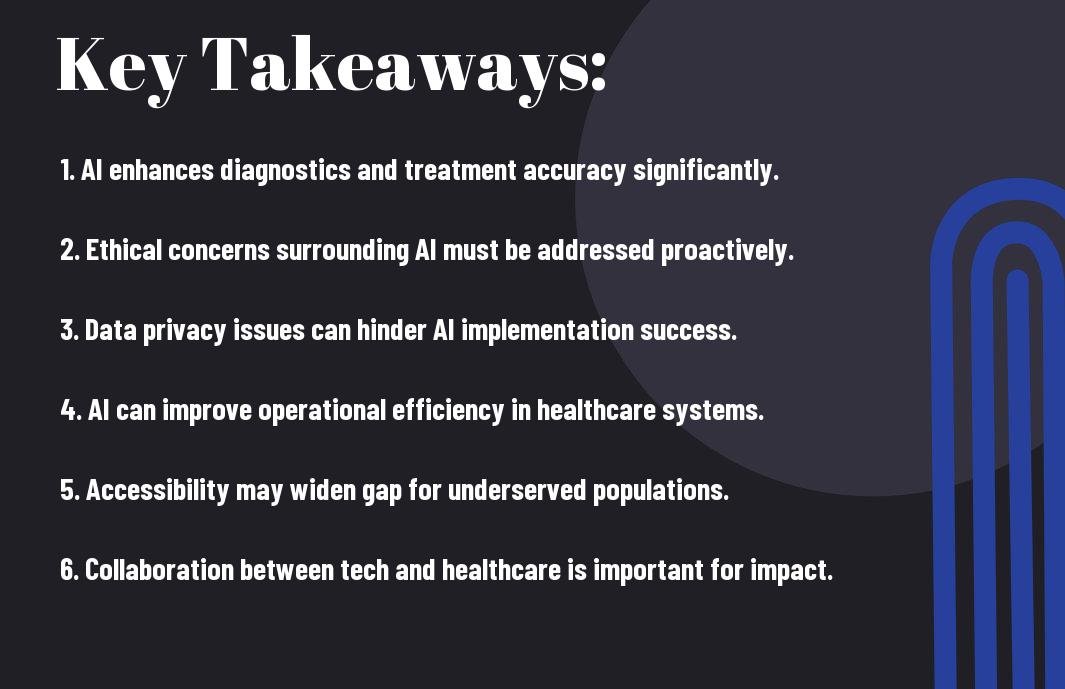There’s a growing conversation around the potential of AI-based solutions to transform healthcare as we know it. As you navigate the complexities of this evolving field, you may wonder if these technological advancements can truly address the myriad challenges faced by healthcare systems globally. From enhancing diagnostic accuracy to streamlining patient care, AI has the potential to revolutionize the sector. However, it raises important questions about accessibility, ethics, and the role of human professionals. In this blog post, we’ll explore the capabilities and limitations of AI in tackling pressing healthcare issues.
Key Takeaways:
- Efficiency: AI-based solutions can significantly enhance the efficiency of healthcare systems by automating routine tasks and streamlining processes.
- Data Analysis: They excel at processing and analyzing large volumes of data, providing insights that can lead to better diagnostics and treatment options.
- Access: AI technologies can improve access to healthcare services, particularly in remote or underserved areas, by enabling telemedicine and remote monitoring.
- Personalization: AI fosters a more personalized approach to patient care, tailoring treatments based on individual genetic makeups and histories.
- Ethical Considerations: The rise of AI in healthcare raises significant ethical concerns, including data privacy issues and the potential for bias in AI algorithms.

Understanding AI in Healthcare
The integration of artificial intelligence (AI) in healthcare has transformed various aspects of patient care and operational efficiency. You will find that AI technologies streamline processes, enhance diagnostic accuracy, and personalize treatment plans, leading to improved overall healthcare outcomes.
Definition and Types of AI
Above, you will see a breakdown of various definitions and types of AI that are shaping the healthcare industry:
| Type of AI | Description |
| Machine Learning | Algorithms that learn from data patterns to improve decision-making. |
| Natural Language Processing | Analyzing and understanding human language for various applications. |
| Computer Vision | AI that enables computers to interpret and process visual information. |
| Robotics | Automated systems assisting in surgeries and patient care. |
| Predictive Analytics | Using data to forecast future patient outcomes or disease outbreaks. |
Perceiving these various types allows you to appreciate the breadth of AI’s applications in healthcare settings.
Current AI Applications in Healthcare
Definition of current AI applications in healthcare encompasses a range of technologies designed to improve diagnosis, treatment planning, and patient management. You can observe how machine learning algorithms are employed to analyze medical images, while natural language processing assists clinicians in navigating electronic health records more efficiently.
Hence, AI has made significant strides in areas such as predictive analytics for patient outcomes, robotic-assisted surgeries, and personalized medicine. With the power to analyze vast amounts of data quickly, AI systems support healthcare professionals in making informed decisions, ultimately enhancing patient care and operational practices in your healthcare environment.

Benefits of AI-Based Solutions
Some of the key benefits of AI-based solutions in healthcare include enhanced data analysis, streamlined processes, and the potential for personalized medicine, all of which ultimately contribute to better patient outcomes. By leveraging advanced algorithms, these technologies can analyze vast amounts of information quickly, providing insights that were previously unattainable. This makes healthcare not only more effective but also more accessible.
Improved Diagnostics and Treatment
After the integration of AI tools, you can expect significantly improved diagnostics and treatment plans. AI algorithms are capable of detecting patterns in medical imaging and clinical data that may elude even the most experienced healthcare professionals. This leads to earlier detection of conditions, tailored treatment suggestions, and continuous monitoring that enhances patient care.
Efficiency and Cost-Reduction
Beside improved diagnostics, AI enhances efficiency, contributing to cost-reduction in healthcare systems. This technology optimizes various processes, from administrative tasks to patient care workflows, allowing healthcare providers to allocate resources more effectively and reduce wait times.
AIBased solutions are designed to automate routine tasks such as appointment scheduling, billing, and data entry, freeing up healthcare professionals to focus on critical patient care. By minimizing human error and improving consistency, these systems not only enhance productivity but also lower operational costs. Over time, the financial savings can be redirected toward innovative treatments and improved patient facilities, ultimately benefiting your overall healthcare experience.
Challenges and Limitations
Once again, while AI-based solutions hold potential for transforming healthcare, they are not without challenges. The integration of these technologies often faces hurdles such as system interoperability, workforce preparedness, and varying levels of access across populations. Moreover, concerns about the accuracy and reliability of AI-driven decisions can hinder their acceptance in clinical environments. For more on this subject, you can explore the emerging role of artificial intelligence in global health care.
Data Privacy Concerns
Any use of AI in healthcare raises significant data privacy concerns. Patient data is sensitive, and breaches can lead to severe implications for individuals. You must be aware that ensuring robust data protection protocols is imperative to maintaining patient trust and safeguarding personal information in AI applications.
Ethical Implications
Challenges surrounding AI in healthcare also extend to ethical implications. The deployment of AI systems raises questions about accountability, consent, and bias in decision-making processes.
Also, addressing ethical implications is vital to ensuring that AI solutions do not inadvertently reinforce existing biases in healthcare. You should consider how algorithms are trained, as they can reflect societal inequities if not carefully managed. Discussing informed consent and the transparency of AI operations with patients is equally important, as you navigate the complexities that arise from implementing these technologies in sensitive healthcare settings.
Case Studies: AI Success Stories
Your understanding of AI in healthcare can be enhanced by examining notable case studies where artificial intelligence has made significant impacts:
- IBM Watson for Oncology: Assisted in diagnosing cancerous tumors with an accuracy rate of 93%.
- PathAI: Improved biopsy diagnostics with a reported accuracy increase from 66% to 95%.
- Google DeepMind: Demonstrated 94% accuracy in detecting eye diseases through retinal scans.
- Freenome: Leveraged AI to detect early-stage colorectal cancer with a sensitivity of 90%.
For more insight, explore Revolutionizing healthcare: the role of artificial intelligence in ….
AI in Disease Detection
Around the world, AI has transformed disease detection methodologies. It can analyze vast datasets in seconds, enabling healthcare professionals to identify conditions like diabetes, Alzheimer’s, and various cancers earlier than traditional methods, leading to better patient outcomes.
AI in Personalized Medicine
Along with improving disease detection, AI significantly contributes to personalized medicine, which tailors medical treatment to individual characteristics. It analyzes genetic data, lifestyle choices, and environmental factors to recommend the most effective therapies.
Even more, AI’s ability to predict treatment responses revolutionizes patient care by enabling custom medication plans. Algorithms designed to correlate genes with drug interactions facilitate targeted therapies, decreasing side effects and improving efficacy. This personalized approach optimizes healthcare resources and enhances patient satisfaction.
The Future of AI in Healthcare
All indications point towards an exciting and transformative future for AI in healthcare. You can expect advanced algorithms and machine learning models to drive innovation in diagnostics, treatment planning, and patient management. As these technologies continue to evolve, they have the potential to enhance efficiencies and improve patient outcomes, making healthcare more accessible and effective for everyone.
Trends and Innovations
Future advancements in AI will focus on personalized medicine, where algorithms analyze genetic data and lifestyle factors to tailor treatments specifically for you. Telemedicine and AI-driven diagnostic tools are emerging trends that promise timely access to medical expertise, making healthcare services more responsive to your needs. Additionally, predictive analytics will increasingly inform proactive care strategies, minimizing health risks before they escalate.
Potential Global Impact
On a global scale, the integration of AI in healthcare could redefine how services are delivered and managed. By breaking down geographical barriers, AI-powered tools can empower healthcare systems in underserved regions, ensuring that you and others receive the necessary care regardless of location.
Global adoption of AI-based healthcare solutions is poised to revolutionize health equity and outcomes. By providing access to real-time data and analytics, healthcare systems around the world can better allocate resources and identify health trends. This can lead to more effective disease prevention strategies and treatment protocols, ultimately improving health for you and countless individuals, regardless of your geographic or socioeconomic status. As these technologies mature, you may witness a healthcare landscape that is more inclusive, efficient, and responsive to the diverse needs of populations around the globe.
Summing up
Considering all points, you can see that while AI-based solutions offer significant potential to improve healthcare outcomes and streamline processes, they are not a one-size-fits-all remedy for global challenges. Your understanding of these technologies should include their limitations, ethical considerations, and the need for human oversight. As you navigate the evolving healthcare landscape, it’s imperative to combine AI innovations with existing systems and personal interactions to truly address the multifaceted issues affecting global health.